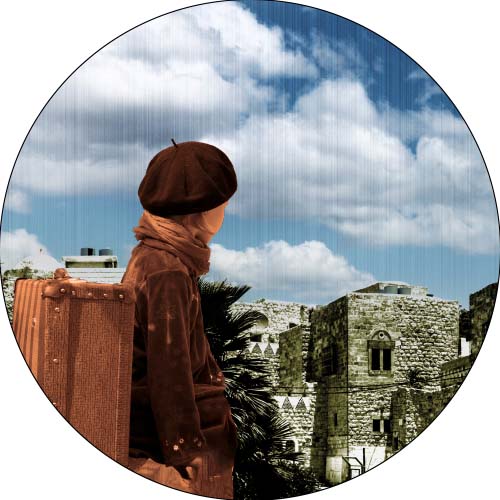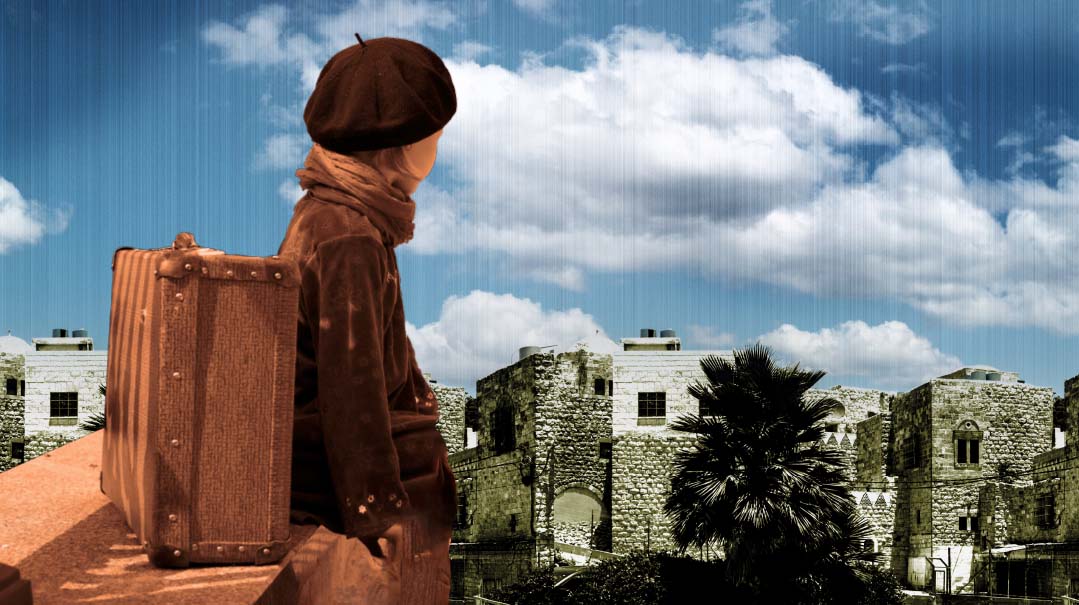Building Dreams: Chapter 13
| May 17, 2022“There’s nothing more we can do for him,” Mama whispered through her pain

Elka
It was only later, hours later, as we sat trying to choke down the cholent someone had decided to bring from the baker’s oven, that I could think about what had happened.
We were in the British police station. All of us. Every Jew who had survived. And someone had brought out the pots of cholent that were left to keep warm in the baker’s oven over Shabbos. Not that we could think about cholent. No. The sounds and images of the past few hours reverberated in our ears, and though we all ate, I don’t think anyone was thinking about the food.
I held Yisroel close, and tried to feed Leiba with my other hand.
“Here, Leiba,” I coaxed, trying to get her to open her mouth. She hadn’t eaten anything all day. “Open your mouth. It’s yummy and hot.”
“Mama,” she whined, pushing away the spoon. But she couldn’t have Mama right now. And what could I tell her? That Mama was lying in the next room, Dovid beside her, the two of them waiting for someone to come and finally take them to the hospital? That Mama, with her bleeding hands, couldn’t come to feed her?
I swallowed, hard. “Mama can’t come right now,” I said in what I hoped was a calm and reassuring voice, “Please eat. Cholent — you love cholent.” I tried to bring the spoon to her lips again, but she just pushed it away once more. “Miriam?” I looked over at my younger sister pleadingly.
Miriam had been in shock this whole time, staring into space and leaving me to take care of Leiba and Yisroel by myself. Ever since she had left the back room where we had been hiding and seen what had happened, she hadn’t said a word. When Mr. and Mrs. Haajib walked through the door, after we had thought it was all over, I had seen her body tremble. But still she did not make a sound. It turned out that they wanted to help us. It was they who got us here, to the British police station. Some bochurim from the yeshivah helped us get Mama and Dovid here, as well. And even Papa… no I would not think about that. I couldn’t think about that. Instead, I turned back to Leiba and tried to get her to eat some food.
“Leiba, come,” I cajoled, once again bringing the spoon to her lips.
And then, suddenly, Miriam was there. She took the bowl and spoon from my hands and pulled Leiba onto her lap. “Here, Leiba,” she whispered. The first words she had uttered in hours. And then, miraculously it seemed to me, Leiba opened her mouth and ate.
I looked at them, a feeling of relief flooding my body. If Miriam and Leiba were okay, I could manage. I turned to feed Yisroel some food. He needed to eat too, after all.
I looked around the large room we were sitting in. All of us, the neighbors and friends and people we just knew from living in a small community, we were all here. It was almost like a jail. Us, locked inside; the Arabs outside. Like a jail — only backward. Because we were locked inside to protect us from the crazy people beyond those doors who wanted to kill us. And the British police? Well, just like they had done nothing to stop those bloodthirsty Arabs from harming us, they were now holding us hostage instead of rounding up the criminals.
My mind kept going back to the events that happened over the day. To the hiding, and the fear, but even more to moments when I first saw Mama. I helped her. Of course I helped her. I tied bandages and cloth — whatever I could find — to stop the bleeding. And then I asked about Papa. Could I help him? Mama looked at me and gently shook her head.
“What do you mean?” I asked, careful to keep the panic out of my voice. How could Papa not need my help? He was injured. I knew he was.
“There’s nothing more we can do for him,” Mama whispered through her pain. And I knew what that meant. It meant he was gone. That those terrible, horrible men who we once counted amongst our friends had taken my Papa from me.
But I couldn’t cry. I couldn’t hold Mama tight and cry and scream about those horrible murderers who would kill someone so good like my Papa. No. I needed to get help. It was then that Mr. Haajib and his wife walked through the door. At first, I thought they had come to finish off the rest of us, but they said they were there to help. And now we were here. All together in this British jail, waiting to see what they were going to do with us.
“Batya,” I called out, spotting my friend sitting only a short way away from us. Her face looked like everyone else’s in the room, drawn, and scared, and pale. But how good it felt to see her here, alive and safe. All around us, people were sharing their stories as they cried about what had happened. No matter that it was still Shabbos. We were all just too shaken to care.
Batya came over to sit next to me. “Elka,” she said, touching my arm, “are you okay?”
I nodded. I was okay. I really was. “How did you stay okay?” I asked, and she understood what I really meant. How did you survive?
“My Arab neighbor,” she explained, “he hid us in his yard and they didn’t find us. You know him — he worked for your father, I think.”
Issa. I swallowed hard. If we had followed Issa to his yard would we also have been safe? Would Papa still be here? Mama and Dovid not have gotten hurt? But how could we have known?
Suddenly, there was a lot of movement in the front of the room. “What’s going on?” I asked. What was happening?
Batya shook her head. “I don’t know.” She tapped the person in front of us. “What’s happening?”
The woman turned around. “It seems the British are sending us buses,” she said, her voice empty of all expression. For a moment I wondered what she had seen that left her voice so empty.
And then the meaning of her words hit me. “Buses?”
“To Yerushalayim,” someone else nearby added.
“But— but it’s Shabbos,” I replied, although no one was listening. It didn’t feel like Shabbos, but it was. How could we get on a bus on Shabbos? And what would we do when we got to Yerushalayim?
Some people looked at me strangely as they got up to pack up their things. I could see a few bochurim in the front talking loudly with the British policemen, but I couldn’t hear what they were saying. Would we really be traveling on Shabbos?
“Pikuach nefesh,” Batya explained, before heading back to the place where her own family was gathering its things and getting ready to leave.
It was true. Here, we weren’t safe at all. Any minute, the Arabs could come back and finish us off. And besides, Mama, Dovid — all the injured people — needed to get to the hospital fast. Shakily, I stood up and began to prepare to leave.
To be continued…
(Originally featured in Mishpacha Jr., Issue 911)
Oops! We could not locate your form.


